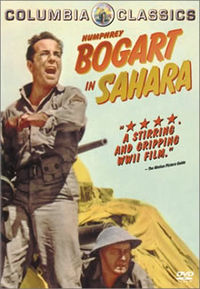I still have my weird leather helmet.
Dear Word Detective: Where did the word “jerrycan” come from? — Achintyarup Ray.

Lulu Belle
Ah, a succinct question, but one that brings back pungent memories. It was back in 1942, just before the second battle at El Alamein, when our tiny tank Lulu Belle and its crew were marooned in the trackless Sahara. Just me, Humphrey Bogart, Dan Duryea, my pal Frenchie, and a bunch of guys whose names I never caught. We had run out of water the week before and were surviving on six jerrycans of cheap red wine Frenchie had found when the real Jerries (German troops) showed up. Things were pretty hazy by that point, but apparently the Germans were big Bogie fans, so they surrendered toot sweet and we all went home. Then Bogart stole our story and made a movie about it called “Sahara.” Frenchie and I never saw a dime of the loot, but we’ll always have El Alamein.

Not fair, Bogie.
OK, my memory may be playing tricks on me in that paragraph, but there is a direct connection between “jerrycan,” meaning a flat-sided five-gallon metal container usually used to carry or store gasoline, and the German army during World War II. The Germans developed this distinctive type of container early in the war, and considered its design a military secret. After Allied troops captured a few, the British and American forces copied the design and issued millions of the cans to their troops in the field. Since “Jerry” (derived from the word “German”) had been derogatory slang for German soldiers among British troops since World War I, the containers were immediately known as “jerrycans” (or, occasionally, “jerricans”). The genius of the jerrycan was that it could be easily stored, could be carried by one soldier, and, unlike other cans in use at the time, allowed the contents to be poured without a funnel or hose. Jerrycans are still used by many armies and are common in civilian use as well, but are now usually made of plastic.
The “jerry” in “jerrycan” brings to mind two other terms that often cause confusion. We speak of something as being “jerrybuilt” when it is poorly made of inferior materials or constructed in a flimsy fashion. But this “jerry” seems to be unconnected to the slang “German” sense of “jerry,” and “jerrybuilt” dates back to the late 19th century. It’s likely that “jerrybuilt” is connected to an actual person named “Jerry,” perhaps a particularly notorious homebuilder, but the exact source is unknown. “Jury-rigged,” on the other hand, means that something, once broken, has been patched together well enough to work for the moment. It comes from the old naval term “jury-mast,” meaning a temporary, makeshift mast substituted for one broken at sea. The standard theory, although unverified, is that “jury” was originally short for “injury.” This “jury-rig” appears to be completely unconnected to “jury rig” in the “subvert a trial” sense.
The English language being the unruly child that it is, you’ll often hear various “mashups” of these terms, “jerryrig” in particular, and it’s probable that eventually “jury-rigged” and “jerrybuilt” will simply fuse into one term. But for the moment, there remains a shade of difference between the two, as “jerrybuilt” connotes deliberately shoddy work, while “jury-rigged” describes an honest attempt to make do in an emergency.




Leave a Reply